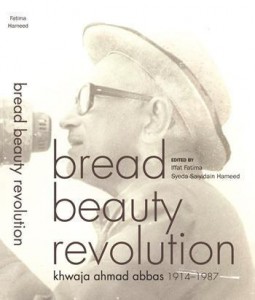Bread Beauty Revolution
Khwaja Ahmad Abbas, 1914-1987
de Khwaja Ahmad Abbas et Syeda Hameed


Moyenne des votes : ![]()
| 0 | vote | |
| 0 | vote | |
| 0 | vote | |
| 0 | vote |
Votre vote : -
Description de l'ouvrage:
Khwaja Ahmad Abbas distinguished himself by his ceaseless passion for revolutionary politics, which he expressed through his writings and films. He was a visionary who strongly believed that creative and artistic interventions are indispensable to nation-building. Bread Beauty Revolution, spanning the years 1914 to 1987, encapsulates Abbas's work, ideas, and ideals. It also provides an insight into the beginnings of modern India. The volume encapsulates 74 books, 40 films, 89 short stories and 3,000 pieces of journalistic writing byAbbas. His work flows in three languages – Urdu, Hindi, and English – and he translated his own writings freely from one language to another.
The volume is in ten parts: (i) 'Abraham and Son', about Abbas's birth and upbringing; (ii) 'I Write as I Feel', which includes Abbas's first and best known short story 'Ababeel' (Sparrows), the story of Abbas's struggle after the publication of his short story 'Meri Maut' (also called 'Sardarji'), and Mulk Raj Anand's letter celebrating his literary genius; (iii) 'My First Love Affair', on his lifelong relationship with and unabashed admiration for Jawaharlal Nehru; (iv) 'Naya Sansar', the witnessing of the birth of an independent India; (v) 'Dharti ke Lal', recounting Abbas's love–hate relationship with the Left movement of which he was an outspoken advocate as well as fearless critic, his account of the birth of IPTA, writing the play Zubaidah and being invited to make the film Dharti ke Lal; (vi) 'Bambai Raat ki Bahon Mein', about another love that gripped his mind and soul, the Indian film industry; (vii) 'Reminiscences', containing personal accounts by people whose lives Abbas influenced, as well as a short story by him, 'Achchan ka Aashiq' (Achchan's Lover); (viii) 'Jagte Raho', an account of Abbas's fight against the censorship imposed on his film Char Shehar Ek Kahani (Four Cities, One Story), 1968, which led to the famous case, K.A. Abbas versus the Union of India, and the landmark judgment in his favour holding that pre-censorship of cinema was a violation of freedom of expression; (ix) 'Ek Aadmi', Abbas's 'beginning' as well as his 'end': his review of Shantaram's film Aadmi which brought him to the film world, and Ek Aadmi, his last film, which had a posthumous birth; andfinally, (x) 'Rahi', named after the eponymous movie Abbas made in 1953 about tea garden workers.
À propos des auteurs :
Iffat Fatima is an independent filmmaker from Kashmir, based in Delhi. Her films include Lanka: the other side of war and peace, The Kesar Saga, In the Realm of the Visual, Boojh Sakey to Boojh, and Khoon Diy Baarav (Blood Leaves Its Trail).Syeda Saiyidain Hameed is the Founder Member of the Muslim Women's Forum and a Founder Trustee of the Women's Initiative for Peace in South Asia as well as a widely recognized author of books on Islam, Sufism, gender and development, and modern Indian history.
Voir le site internet de l'éditeur Tulika Books
Voir la filmographie complète de Khwaja Ahmad Abbas sur le site IMDB ...
> Sur un thème proche :
Resistance in Indian Documentary Film (2024)
Aesthetics, Culture and Practice
Dir. Shweta Kishore et Kunal Ray
John–Ghatak–Tarkovsky (2023)
Citizens, Filmmakers, Hackers
The Indian Partition in Literature and Films (2019)
History, Politics, and Aesthetics
Dir. Rini Bhattacharya Mehta et Debali Mookerjea-Leonard
Sujet : Countries > South Asia
Popular Cinema and Politics in South India (2017)
The Films of MGR and Rajinikanth
Film and Politics in India (2015)
Cinematic Charisma as a Gateway to Political Power